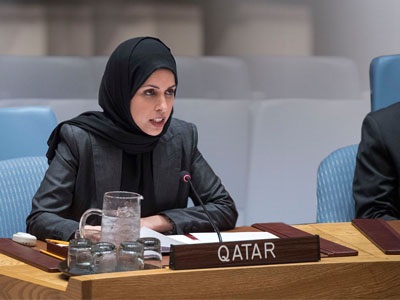Qatar Affirms Importance of Adhering to All Nuclear Disarmament and WMD Treaties, Warns against Cyber Attacks

New York / Information Office / October 13
The State of Qatar underlined the importance of adhering to all conventions and treaties related to nuclear disarmament and weapons of mass destruction (WMD), and warned against the phenomenon of cyber attacks, expressing its aspiration for all countries to join those agreements, in order to contribute to achieving international peace and security and preserving future generations and environmental systems from the risk of those weapons.
Addressing the general debate of all agenda items related to disarmament and international security of the First Committee of UN General Assembly at its 75th session, HE Permanent Representative of the State of Qatar to the United Nations Ambassador Sheikha Alya Ahmed bin Saif Al-Thani stated that the world has become more dependent on modern information and communication technology in the field of education and business than ever before, especially in light of the outbreak of the coronavirus (COVID-19) pandemic.
In this context, HE Sheikha Alya Al-Thani noted the emergence of the phenomenon of cyber attacks on vital institutions and facilities, and stressed that the State of Qatar had suffered from the impact of the cyber attack when it was subjected to a cyber attack through the hacking of Qatar News Agency which sparked a crisis that set the stage for an unjust and illegal blockade against the State of Qatar more than three years ago. That cyber attack had dangerous repercussions on regional and international peace and security, and casted a shadow over regional and international cooperation.
HE underlined that the increase and spread of cyber attacks represents a serious challenge to the foundations of international relations, and its complications are reflected in the security and stability of the international community, as the misuse of cyberspace has become a serious threat to states and individuals, and has become a source of conflict and disagreement.
She noted that the threat of proliferation of nuclear weapons and weapons of mass destruction, including chemical and biological weapons, continues to pose a threat to states and peoples and violates the human rights of many societies, adding that this danger increases with the possibility of terrorist groups obtaining these weapons, especially in areas affected by armed conflicts where there is no principles of legal accountability and accountability for the crimes and atrocities committed.
She underlined that any use of chemical weapons anywhere in the world and under any circumstances poses a serious threat to the nonproliferation system that the international community has worked to establish for decades.
HE Sheikha Alya pointed to the international community's rejection and condemnation of the use of these deadly weapons in Syria, as confirmed by various UN reports, which requires accountability for the perpetrators of these crimes as the use of toxic substances as war weapons is a war crime and a crime against humanity.
HE the Ambassador indicated that the international communitys rejection of these heinous crimes was evident in the General Assembly establishing the International, Impartial and Independent Mechanism to assist in the investigation and prosecution of persons responsible for the most serious crimes in Syria since March 2011.
HE Permanent Representative of the State of Qatar to the United Nations Ambassador Sheikha Alya Ahmed bin Saif Al-Thani pointed out that the State of Qatar continues to develop and update national legislation related to weapons of mass destruction in line with its obligations under the agreements it has joined.
HE the Ambassador referred to the framework of close cooperation between the State of Qatar and the Organisation for the Prohibition of Chemical Weapons (OPCW), as the National Committee for the Prohibition of Weapons, in cooperation with the OPCW, organized during the period from 4-6 February 2020, at the Doha Regional Center for Training on Agreements Related to Weapons of Mass Destruction, the international training course on medical management of chemical injuries at the scene of the event. The training witnessed the participation of 11 experts representing states party to the Chemical Weapons Convention, in addition to OPCW experts and those involved in state institutions.
HE the Ambassador added that despite the positive results achieved in the field of disarmament and its impact on peace, security, and stability in many regions of the world, the Middle East region still lacks security and stability, expressing the State of Qatar's grave concern about the lack of remarkable progress to evacuate the Middle East region from nuclear weapons, failure to implement the obligations arising from the outcomes of the 1995 NPT Review Conference, the steps of the 2000 Review Conference and the 2010 Action Plan, as well as the failure of the 2015 NPT Review Conference.
HE the Ambassador reiterated the State of Qatar's support for holding the second session of the UN conference on establishing a free zone of nuclear weapons and other weapons of mass destruction in the Middle East in 2021, expressing the State of Qatar's aspiration for the cooperation of all countries in the region to achieve this goal, in the service of its people and in a way that enhances international peace and security.
HE the Ambassador pointed out that the spread of the COVID-19 pandemic demonstrated the urgent need for international cooperation, especially in countries experiencing armed conflicts and post-conflict societies, reiterating the State of Qatar's emphasis on the importance of responding to the UN Secretary-General's call for a ceasefire in all around the world to fight this pandemic in a way that contributes to achieving international peace and security.
In the conclusion of her statement, HE the Ambassador affirmed the State of Qatar's commitment to its responsibility as a state party to international instruments in the field of disarmament and a partner in the international efforts to achieve international peace and security.

